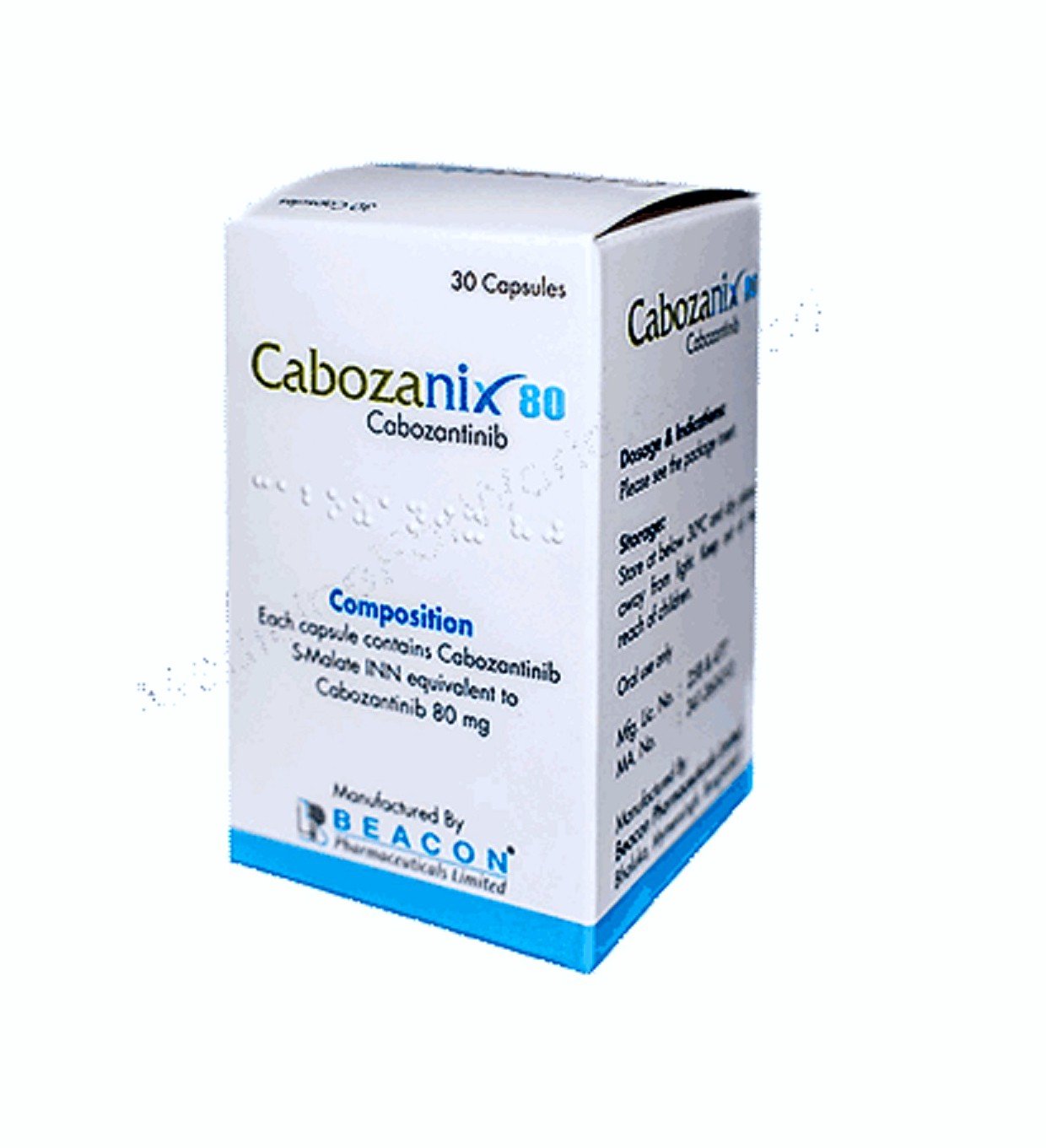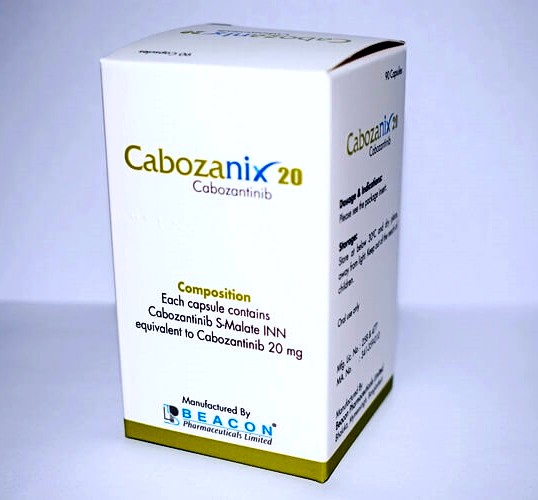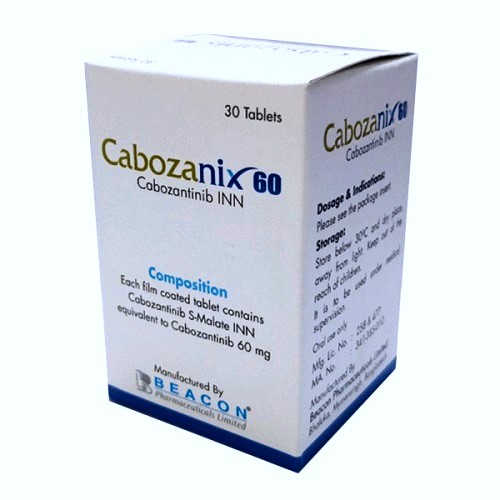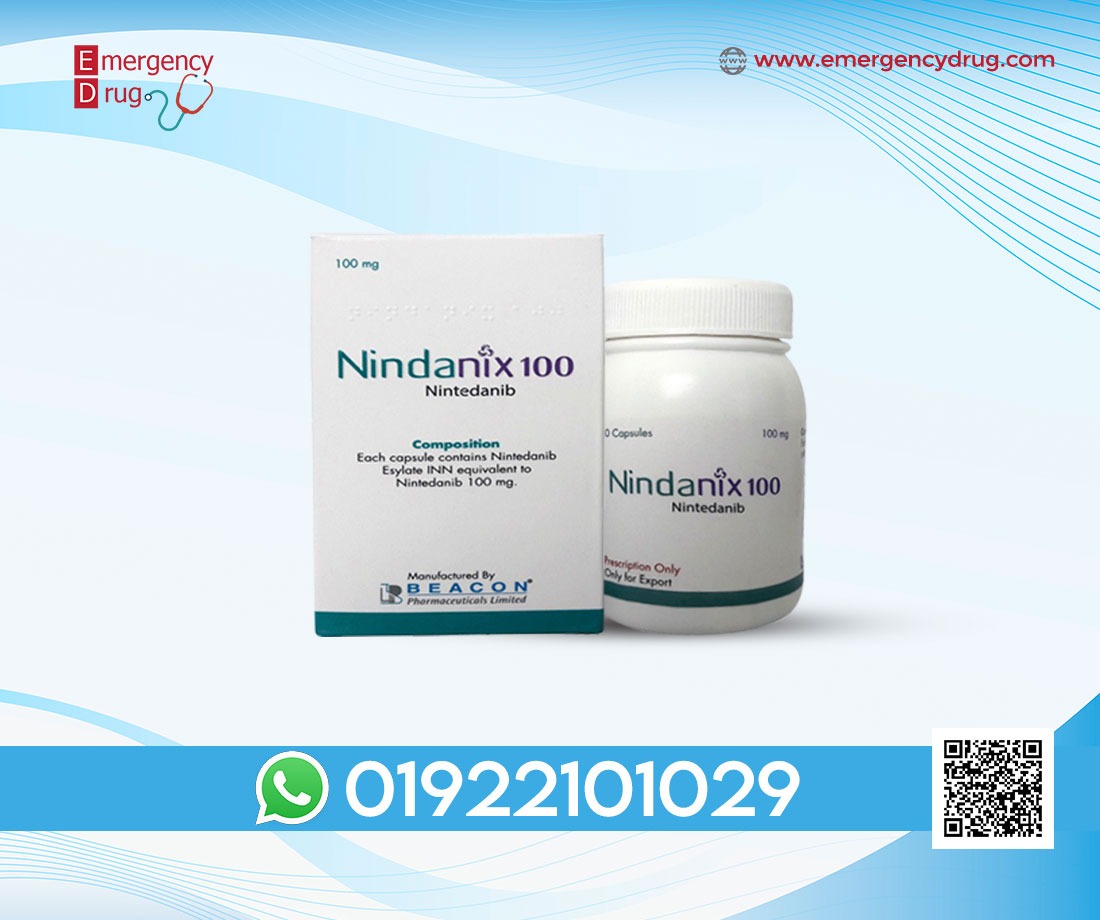
Cabozanix (Cabozantinib) 80 MG
Price: $935.00
Cabozanix (Cabozantinib) is a tyrosine kinase inhibitor, indicate for the treatment of patients with progressive, metastatic medullary thyroid cancer (MTC). Cabozantinib inhibits the kinase activity of certain receptors that are responsible for various pathological processes such as oncogenesis, metastasis, tumor angiogenesis, drug resistance, and maintenance of the tumor microenvironment.


Description
Cabozanix (Cabozantinib) is the medication for the trade chemotherapy drug. In some cases, health care professionals may use the trade name Cabozanix when referring to the generic drug name Cabozantinib.
Drug type: Cabozantinib is a targeted therapy. It is an oral receptor tyrosine kinase inhibitor.
Product Name : Cabozanix
Generic Name : Cabozantinib
Formulation : Capsules
Strengths : 80 mg
Manufacturer : Beacon Pharmaceuticals Ltd.
Working process of Cabozantinib:
Targeted therapy is the result of about 100 years of research dedicate to understanding the certain between cancer cells and normal cells. To date, cancer treatment focus primarily on killing rapidly dividing cells because one feature of cancer cells is that they divide rapidly. Unfortunately, some of our normal cells divide rapidly too, causing multiple side effects.
Targeted therapy is about identifying other features of cancer cells. Scientists look for specific differences in the cancer cells and the normal cells. This information use to create a targeted therapy to attack the cancer cells without damaging the normal cells, thus leading to fewer side effects. Each type of targeted therapy works a little bit differently but all interfere with the ability of the cancer cell to grow, divide, repair and/or communicate with other cells.
There are different types of target therapies, defined in three broad categories. Some targeted therapies focus on the internal components and function of the cancer cell. The targeted therapies use small molecules that can get into the cell and disrupt the function of the cells, causing them to die. There are several types of targeted therapy that focus on the inner parts of the cells. Other targeted therapies target receptors that are on the outside of the cell. Therapies that target receptors are also known as monoclonal antibodies. Antiangiogenetic inhibitors target the blood vessels that supply oxygen to the cells, ultimately causing the cells to starve.
Cabozantinib Used For:
- For the treatment of metastatic medullary thyroid cancer (MTC).
- Use to treat of advanced renal cell carcinoma.
- Using of patients with hepatocellular cancer (HCC) who have previously received sorafenib.
Cabozantinib Is Given:
- Cabozanix (Cabozantinib) is a pill, taken by mouth.
- Take Cabozantinib on an empty stomach. Do not eat for at least 2 hours before and at least 1 hour after taking Cabozantinib.
- You should not drink grapefruit juice or eat grapefruit during treatment with Cabozantinib. It may change the amount of Cabozantinib in your blood.
- Take Cabozantinib exactly as prescribed.
- Swallow Cabozantinib capsules whole with at least 8 ounces of water. Do not crush, dissolve or open capsules.
- Do not change your dose or stop Cabozantinib unless your health care provider tells you to.
- If you miss a dose and your next dose is due in:
- Less than 12 hours, take your next dose at the normal time. Do not make up the next dose.
- 12 hours or more, take the missed dose as soon as you remember. Take your next dose at the normal time.
- Do not take more than 1 dose of Cabozantinib at one time. Call your health care provider right away if you take too much.
- The amount of Cabozantinib that you will receive depends on many factors, your general health or other health problems, and the type of cancer or condition being treated. Your doctor will determine your dose and schedule.
Side Effects:
Important things to remember about the side effects of Cabozanix (Cabozantinib):
- Most people do not experience all of the side effects listed.
- Side effects are often predictable in terms of their onset and duration.
- almost always reversible and will go away after treatment is complete.
- A lot of options to help minimize or prevent side effects.
- There is no relationship between the presence or severity of side effects and the effectiveness of the medication.
The following side effects are common (occurring in greater than 30%) for patients taking Cabozantinib:
- Increased liver enzymes
- Diarrhea
- Low calcium
- Mouth sores
- Hand-foot syndrome (Palmar-plantar erythrodysesthesia or PPE) -skin rash, swelling, redness, pain and/or peeling of the skin on the palms of hands and soles of feet. Usually mild, starting 5-6 weeks after start of treatment. May require reductions in the dose of the medication.
- Weight loss
- Decreased appetite
- Nausea
- Fatigue
- Oral pain
- Neutropenia
- Low platelets
- Taste changes
- Hair color changes
- High blood pressure
These side effects are less common side effects (occurring in about 10-29%) of patients receiving Cabozanix (Cabozantinib):
- Low phosphorous
- Abdominal pain
- Constipation
- High bilirubin levels
- Vomiting
- Weakness
- Voice changes
- Dry skin
- Rash
- Low magnesium
- Headache
- Low potassium
- Hair loss
- Dizziness
- Joint pain
- Swallowing trouble
- Muscle spasms
- Dyspepsia (indigestion)
- Skin redness
- Low sodium
Serious complications of Cabozantinib:
- Perforation (holes) in the GI (gastrointestinal) tract
- Very bad bleeding (hemorrhage)
- Impaired wound healing, fistulas
- Blood clots
Contact your health care provider right away if you have any new or worsening symptoms.
Contact your doctor or health care provider:
Seek emergency help immediately and notify your health care provider, if you experience the following symptoms:
- Chest pain, shortness of breath
Contact your health care provider immediately, day or night, if you should experience any of the following symptoms:
- Fever of 100.4° F (38° C or higher, chills)
- Unusual bleeding
- Black or tarry stools, or blood in your stools
- Severe headache, light headedness or other neurological symptoms (numbness, tingling, difficulty speaking, Change in thinking clearly and with logic).
Always inform your health care provider if you experience any unusual symptoms.
The following symptoms require medical attention, but are not an emergency. Contact your health care provider within 24 hours of noticing any of the following:
- Diarrhea (4-6 episodes in a 24-hour period).
- Nausea (interferes with ability to eat and unrelieved with prescribed medication).
- Vomiting (vomiting more than 4-5 times in a 24 hour period).
- Unable to eat or drink for 24 hours or have signs of dehydration: tiredness, thirst, dry mouth, dark and decrease amount of urine, or dizziness.
- Skin or the whites of your eyes turn yellow
- Urine turns dark or brown (tea color)
- Decreased appetite
- Pain on the right side of your stomach
- Bleed or bruise more easily than normal
- Itching
- Cough with or without mucus
- Mouth sores
- Pain or burning with urination
- Extreme fatigue (unable to carry on self-care activities)
Precautions:
- Before starting Cabozanix (Cabozantinib) treatment, make sure you tell your doctor about any other medications you are taking (including prescription, over-the-counter, vitamins, herbal remedies, etc.).
- Do not receive any kind of immunization or vaccination without your doctor’s approval while taking cabozantinib.
- Inform your health care professional if you are pregnant or may be pregnant prior to starting this treatment. Pregnancy category D (cabozantinib may be hazardous to the fetus. Women who are pregnant or become pregnant must be advised of the potential hazard to the fetus.)
- For both men and women: Do not conceive a child (get pregnant) while taking cabozantinib. Barrier methods of contraception, such as condoms, are recommended during treatment and for 4 months after treatment is complete. Discuss with your doctor when you may safely become pregnant or conceive a child after therapy.
- Do not breast feed while taking this medication.
- You should not drink grapefruit juice or eat grapefruit during your treatment with Cabozanix (Cabozantinib). It may make the amount of Cabozantinib in your blood increase to a harmful level.
Self-Care Tips:
- Drink at least two to three quarts of fluid every 24 hours, unless you are instructed otherwise.
- You may be at risk of infection so try to avoid crowds or people with colds, and report fever or any other signs of infection immediately to your health care provider.
- Wash your hands often.
- Monitor your blood pressure and notify your physician if blood pressure is elevated or if you develop severe headache, light headedness or other neurological symptoms (numbness, tingling, difficulty speaking).
- To help treat/prevent mouth sores, use a soft toothbrush, and rinse three times a day with 1 teaspoon of baking soda mixed with 8 ounces of water.
- Use an electric razor and a soft toothbrush to minimize bleeding.
- Avoid contact sports or activities that could cause injury.
- To reduce nausea, take anti-nausea medications as prescribed by your doctor, and eat small, frequent meals.
- Follow regimen of anti-diarrhea medication as prescribed by your health care professional.
- Eat foods that may help reduce diarrhea (see managing side effects – diarrhea ).
- Prevention of hand-foot syndrome. Modification of normal activities of daily living to reduce friction and heat exposure to hands and feet, for about a week after treatment.
- Keep palms of hands and soles of feet moist using emollients.
- Avoid sun exposure. Wear SPF 15 (or higher) sun block and protective clothing.
- In general, drinking alcoholic beverages should be kept to a minimum or avoided completely. You should discuss this with your doctor.
- Get plenty of rest.
- Maintain good nutrition.
- Maintain physical activity as tolerated.
- If you experience symptoms or side effects, be sure to discuss them with your health care team. They can prescribe medications and/or offer other suggestions that are effective in managing such problems.
Monitoring and Testing:
Checked regularly by your health care professional while you are taking Cabozanix (Cabozantinib), to monitor side effects and check your response to therapy. Periodic blood work obtained to monitor your complete blood count (CBC) as well as the function of other organs (such as your kidneys and liver) also ordered by your doctor.
For more Oncology medicine, visit our SHOP












